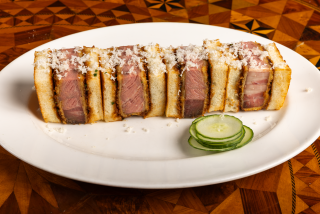Oui the People: Harry’s Bar Bets on the Election
- Share via
RIDGEFIELD, CONN. — Word has come from Paris of the passing of Andy MacElhone, the longtime proprietor of Harry’s New York Bar, almost on the eve of tallying up one of the more unusual presidential polls.
The poll has been conducted among American expatriates and tourists frequenting this Paris bistro since Calvin Coolidge in 1924 was correctly predicted to retain the White House. Its margin of error is said to be 90 proof, the potency of the vodka in Harry’s famous Bloody Mary, a truth serum invented here in the days when Ernest Hemingway, F. Scott Fitzgerald, Gertrude Stein and others of the Lost Generation argued politics and literature at the long mahogany bar.
Patrons of the bar begin casting their ballots for their presidential choices in mid-October. On election day, before the results in America are tallied, the ballots at Harry’s are counted.
Andrew MacElhone, who died peacefully in September on the Riviera at age 73, first went behind the bar as a teenager to assist his father Harry, the eponymous founder of this watering hole that to many Americans abroad ranks with the Eiffel Tower and the Arc de Triomphe as a Paris landmark.
The bar got its full name in 1923, when Harry, a Scot from Dundee who was more Dewar’s than dour, added his name to the New York Bar he bought from American jockey Tod Sloan, who had kicked home a couple of winners at Auteuil. The dark paneled decor, which still resembles the movie set for “The Lost Weekend,” was imported from a joint on Third Avenue called Clancy’s.
Harry began attracting homesick expatriates like Ezra Pound, Thornton Wilder, Sinclair Lewis and the touring Dolly Sisters in their outrageous hats by posting college football scores, serving the first hot dogs ever sold in France and covering the drab walls with pennants from Yale, Harvard, Princeton, Oberlin and others contributed by overseas alumni.
Soon all sorts of celebrities like Jack Dempsey, Primo Canera, Knute Rockne, Ramon Navarro and even the Prince of Wales, with Baltimore divorcee Wallis Simpson on his arm, crowded into the “Downstairs Room” to hear George Gershwin pound out “An American in Paris” on the battered upright.
Hemingway gained Harry’s some early press attention by tossing a mangy lion out through the swinging doors. Like the elephant Groucho Marx shot in his pajamas, no one knows quite how the lion got there. Legend says the poor beast was led in on a leash by a punch drunk ex-pug and misbehaved on Papa’s thong sandals.
Anyhow, the literary lion told A.E. Hotchner, his biographer and drinking buddy, that playing bouncer for the king of the beasts gave him the courage to begin “A Farewell To Arms”: “I figured if I was getting that aggressive with lions, the time had come to put my juice into a book.”
For those unacquainted with the password “une dry,” Harry’s flourished as that rare oasis in all France where a thirsty tourist could order a dry martini and not be served a goblet of vermouth blanc devoid of eight parts gin. The bar’s strategic location halfway between the Scribe Hotel, a hangout for the foreign press, and the Ritz, a hospice for Americans with deep pockets, plus the subsequent invention of the Side Car and the French 75 by its resident mixologists added to its success.
Taxi drivers cringed but made straight for Harry’s when Yanks abroad sang out “sank roo doe noo,” the fractured French rendition of No. 5, Rue Daunou.
Hitler’s invasion of France shut down Harry’s and its presidential polling during World War II. Harry escaped to London and tended bar at the Cafe de Paris. Andy joined the British army, became a captain in intelligence and was wounded in Germany. The Nazi occupiers commandeered the premises for an officers club, drank up everything in sight and storage but left the college banners hanging, probably because some of the younger oberleutnants now gathered around Gershwin’s piano bellowing brauhaus ballads had gone to American universities.
Harry returned after the liberation to serve a new lost generation perched on his bar stools. Connie Ryan, researching “The Longest Day,” and Gene Kelly on location rubbed elbows with John Toland, working on his Hitler biography, John Steinbeck on his way to Stockholm to pick up the Nobel Prize, and an Irish contingent led by Liam O’Flaherty and Brendan Behan.
Art Buchwald dropped by on his rounds as social critic for the Paris Herald Tribune. Soldier-novelist James Jones, who settled in Paris, opened a branch of Harry’s in his apartment one spring when the flooding Seine marooned his arrondissement.
After Harry died in 1958, Andy presided over the cocktail shaker and poured for French literary friends like Jean-Paul Sartre, Simone de Beauvoir and Marguerite Duras. In the fall of 1960, taxi gridlock gripped Rue Daunou as straw voters filed through the swinging doors to choose Jack Kennedy over Richard Nixon in the closest-ever barroom ballot.
The last time this reporter saw Paris, Harry’s was under siege by a squadron of U.S. 9th Air Force veterans in town for the 50th anniversary of D-day. A third generation of MacElhones was spearing hot dogs from the big kettle on the bar: Duncan MacElhone, son of Andy and grandson of Harry. He was pleased that my taxi driver, a half-century after my first visit to this cross-cultural think tank, had no trouble decoding “sank roo doe noo.”
In informing me of his father’s death, young Duncan did not venture a guess whether Bill Clinton or Bob Dole would be the toast of Paris or at least Harry’s New York Bar a few weeks hence.
More to Read
Get the L.A. Times Politics newsletter
Deeply reported insights into legislation, politics and policy from Sacramento, Washington and beyond. In your inbox twice per week.
You may occasionally receive promotional content from the Los Angeles Times.










